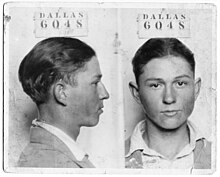Bonnie Parker
| Bonnie Parker and Clyde Barrow | |
|---|---|

Bonnie and Clyde in March 1933 in a photo found by police at the Joplin, Missouri hideout
|
| Bonnie Parker | |
|---|---|

Parker with 1932 Ford V-8 B-400 convertible coupe.
|
|
| Born |
Bonnie Elizabeth Parker October 1, 1910 Rowena, Texas |
| Died | May 23, 1934 (aged 23) Bienville Parish, Louisiana 32°26′28″N 93°05′34″W / 32.441217°N 93.092659°W |
| Cause of death | Gunshot wound by law enforcement |
| Resting place | Crown Hill Memorial Park Dallas, Texas |
| Nationality | American |
| Spouse(s) | Roy Thornton (1926-34; her death) |
| Clyde Barrow | |
|---|---|

Clyde Barrow in 1926, aged 17
|
|
| Born |
Clyde Chestnut Barrow March 24, 1909 Ellis County, Texas |
| Died | May 23, 1934 (aged 25) Bienville Parish, Louisiana 32°26′28″N 93°05′34″W / 32.441217°N 93.092659°W |
| Cause of death | Gunshots by law enforcement |
| Resting place | Western Heights Cemetery Dallas, Texas |
| Nationality | American |
| Height | 5 ft 6 in (1.68 m) |
Bonnie Elizabeth Parker (October 1, 1910 – May 23, 1934) and Clyde Chestnut Barrow a.k.a. Clyde Champion Barrow (March 24, 1909 – May 23, 1934) were American criminals who traveled the central United States with their gang during the Great Depression, robbing people and killing when cornered or confronted. At times, the gang included his older brother Buck Barrow and his wife Blanche, Raymond Hamilton, W. D. Jones, Joe Palmer, Ralph Fults, and Henry Methvin. Their exploits captured the attention of the American public during the "Public Enemy Era," between 1931 and 1935. Though known today for their dozen-or-so bank robberies, the two preferred to rob small stores or rural gas stations. The gang is believed to have killed at least nine police officers and several civilians. The couple were eventually ambushed and killed by law officers near the town of Sailes, in Bienville Parish, Louisiana. Their reputation was revived and cemented in American pop folklore by Arthur Penn's 1967 film Bonnie and Clyde.
Even during their lifetimes, their depiction in the press was at considerable odds with the hardscrabble reality of their life on the road, especially for Bonnie Parker. She was present at a hundred or more felonies during the two years she was Barrow's companion, but she was not a machine gun-wielding killer as depicted in the newspapers, newsreels, and pulp detective magazines of that time. Gang member W. D. Jones later testified he could not recall ever having seen her shoot at a law officer. Bonnie's reputation as a cigar-smoking gun moll grew out of a playful snapshot police found at an abandoned hideout. It was released to the press and published nationwide. While Parker did chain smoke Camel cigarettes, she never smoked cigars.
...
Wikipedia
